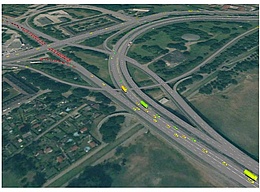EkoZara – Emission minimizing ramp metering for multiple motorway entries
Keywords: Traffic simulation, ramp metering, emission minimizing coordination
In EkoZAra, a coordinated ramp metering for a sequence of entries will be developed further using emissions and delay as an objective function. The system aims to minimize the total traffic induced emission of a road network consisting of a motorway with several junctions and connecting secondary roads. The developed ramp metering system will be verified using a microscopic traffic flow model, an instantaneous emission model for cars and trucks and a subarea network of the city of Linz. Major scientific advancements will be: Further development of an existing coordinated ramp metering system with minimization of traffic emissions as a new objective function; Enhancements of the functionality of traffic induced emission modelling using microscopic traffic flow modelling (VISSIM) and instantaneous emission calculation (PHEM). DOE (Design of Experiment) as a sophisticated methodology to identify the best parameter setting within a large choice set using genetic algorithms. The ramp metering system with a parameter set minimizing emissions will be applied at a virtual test site. A subarea network of Linz will be simulated to identify the potential total savings in emissions and fuel consumption. The ramp metering system will be linked with additional traffic signals on the secondary road network as well as making use of the dynamic speed control system being a major backbone of the traffic management system of the ASFINAG. The coordinated ramp metering system will be developed and tested using a subarea network in the conurbation of Linz, the capital of Upper Austria. All major administration, ASFINAG, the state council of Upper Austria and the city of Linz will participate within EkoZAra. The traffic flow model within the merging zones requires additional calibration which will be conducted using GPS trajectory records supplemented by video data analysis. Cost-benefit analysis will be carried out as decision support for potential actions.
Duration: February 2010 – January 2012

